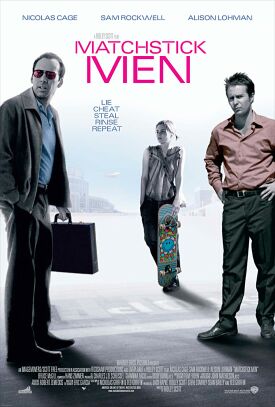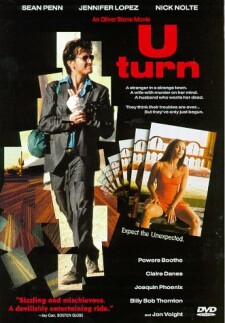Baader Meinhof Complex, The
The title of Uli Edel’s The Baader Meinhof Complex (Der Baader Meinhof Komplex) suggests a psychological rather than political origin of terrorist violence, and this is borne out by the portrayal of Andreas Baader (Moritz Bleibtreu), leader of the 1970s German terrorists who called themselves the Red Army Faction, as a borderline psychopath. In general Mr Edel — who also, with Bernd Eichinger (Downfall), adapted the screenplay from a memoir by Stefan Aust — appears to believe that the R.A.F. did not adopt revolutionary methods to create the socialist paradise envisaged by Lenin or Mao; rather, they adopted the then- and, to a somewhat lesser extent now-glamorous imagery of Lenin and Mao — and, of course, Che and Fidel and Ho Chi Minh — as a kind of shortcut rationalization for their revolutionary methods, which they found thrilling for their own sake. Their terrorist murders, including the murders of American soldiers at military bases in Germany, really do seem to have been an example of the contemporary Yippie ideal of “revolution for the hell of it.”
Yet the film does go so far towards an attempt at some kind of social and political analysis — and, incidentally, glamorizing the terrorists — as to suggest three causes of the violence not having to do with the narcissism, vanity and lust for excitement (among other things) of the participants. It begins on a nude beach in Germany, sometime in the 1960s, which is both a good way to get our attention and to suggest a link with a German revolutionary tradition dating back to the pre-Nazi era. More importantly introduces the narrative germ of the breakup of the marriage of the radical journalist Ulrike Meinhof (Martina Gedeck) who, it is intimated, made the transition from words to deeds partly as a reaction to that breakup. Eventually she breaks up with her children as well — though not, perhaps, without a pang of regret.
The personal was political, it seems, even in those pre-feminist days, which are also evoked by Baader’s unapologetic “male-chauvinism” — “You c***s! Your only liberation is screaming at men,” he shouts at one point — which is looked at unblinkingly. Nowadays, that kind of pre-revolutionary consciousness must make it seem a bit paradoxical, to say the least, when he and the other would-be revolutionaries appear to share the hippie doctrine that the revolution is advanced by aggressive sexual promiscuity in both sexes. “F***ing and shooting are the same,” proclaims Baader to a shocked group of Palestinians at a guerrilla camp as they look wonderingly at the female German guerrillas sunbathing in the nude. He also refers disparagingly to the leader of the Palestinians as “Ali Baba.”
The second source of the Baader-Meinhoff violence is represented as springing from the riots of June 2, 1967 when the then Shah of Iran, visiting Germany, went to the Berlin Opera to a performance of Mozart’s Magic Flute. A German student demonstration against the Shah — whose repressive government was a favored leftist cause in those days because he was allied with the United States — turned into a riot and a student, Benno Ohnesorg (Martin Glade), was shot and killed by a policeman. The film was made before the revelation earlier this year that his killer, Karl-Heinz Kurras, was an East German mole in the West German police — which, given the semi-mythical status that the death of Ohnesorg (whose name in German means “without sorrow” or, perhaps, “carefree”) was later to be accorded, at the least adds an interesting geopolitical element to the subsequent history of German radicalism.
The third element in the radicalization scenario was the shooting of Rudi Dutschke (Sebastian Blomberg) by an assassin who is allowed to say only one thing by way of explanation: “I hate communists.” So, by the end of the movie, might others. Not that our heroes describe themselves as communists in the movie. If they have read Marx or have any post-revolutionary economic program in mind, there is no evidence of it here. Just before Dutschke is shot — he lived on, but in a brain-damaged state — he is shown addressing a big anti-war, anti-American rally and chanting Ho Ho Ho Chi Minh. The war in Vietnam and the existence of the state of Israel as examples of what they see as American “imperialism,” are the only things mentioned throughout the film as the reason why these people do what they do.
Why, you may ask, should American imperialism, assuming for the moment that any such thing existed, cause Germans to kill other Germans? But if the killers have an explanation it is never offered to us. Apart from the psychological ones, if any, their reasons are simply taken for granted — as it appears the terrorists themselves took them for granted. The absence from the movie of even an attempted rationalization of “the armed struggle against imperialism” is telling both cinematically and politically. It suggests the extent to which the hippie-yippie ethos out of which these self-loathing bourgeois revolutionaries emerged in the 1970s — America had its own version of them, but they had fewer and less spectacular terrorist incidents to their credit — still survives in the movie culture of today.
That is why, too, at two and a half hours (it’s even longer in the German version) the movie is much too long and doesn’t appear to know where it’s going. It would have profited by a little more ironic distance from its terrorist heroes, a little bit of historical perspective of the sort that the rest of the world, outside the academic, cinematic and media industries, must have on domestic terrorism by now. In the movie, it’s not even clear that we’re supposed to find it funny when the clergyman father (Michael Gwisdek) of Gudrun Ensslin (Johanna Wokalek) describes her firebombing of a department store as an act of “holy self-redemption.” Always with the self, these baby-boomers, who include Mr Edel, the director. “This is the story of our generation,” he has said of his movie. What else would it be? But those of another generation might have a hard time understanding how the killing or kidnaping of a banker or a policeman, could amount to a blow struck against imperialism even if they thought it appropriate to strike such blows.
In other words, audiences today are quite likely to notice, what was not so much noticed at the time, namely that the “revolution” doesn’t make any sense. So far as we can tell, these naughty children don’t even know what “imperialism” means, apart from identifying it with anything America or Israel do — and not with anything that the Soviet Union or China did. It is whatever they say it is. Their narcissism even extends to the deaths of the leadership — Meinhoff first, then Baader and Ensslin — by suicide in prison. These are the solipsist revolutionaries — though, like Bill Ayers, they still command respect at The New York Times. There, Manohla Dargis proclaimed The Baader Meinhof Complex a “Critic’s Pick,” noting that “Mr. Eichinger lets the group do its own talking, as does the film’s director, Uli Edel, who gives it the pulse and music of a thriller. (The propulsive score echoes those of the “Bourne” movies.) This probably accounts for why some have accused the film of glamorizing terrorism, which misses the point that all terrorism is performative.”
Call me unhip, but that seems to me to be a complete non-sequitur. No one doubts or refuses to recognize that all terrorism is performative, but what has that got to do with either its glamorousness or its unglamorousness, still less with the moral or political principles by which we approve or disapprove of these things? I see from the international pages of today’s Times that the parties of the left in Europe have fallen on hard times, which seems a bit puzzling to the paper’s correspondent, Steven Erlanger, in view of the “Bad Times for Capitalism” that he presumably thinks ought to be throwing up one, two, many Obamas in the paradoxically progressive “Old Europe.” Meanwhile, in the fantasyland of his paper’s cultural sections, as well as in the European and American film industries, we can confidently say that the revolution lives on.
Discover more from James Bowman
Subscribe to get the latest posts to your email.







